高一阅读题练习及答案详解
高一英语阅读理解训练题及答案解析(7篇)

高一英语阅读理解训练题及答案解析(7篇)一、完型填空1.It was a hot, damp summer day. After I 1 my tank in the local gas station, I started to walk inside to pay. Just then I noticed two elderly 2 standing back from their car. There was a mixture of shock and 3 on their faces. I followed their 4 and saw what they saw: five yellow jackets were building a 5 around their gas cap. My eyes 6 . I shared the ladies' fear.Yellow jackets had never been 7 to me. When I was a young boy, a friend of mine and I were 8 and playing in my backyard. I must have 9 on one of their hidden nests while running. 10 , both of us were being chased and stung over and over by the yellow jackets. We ran away 11 with great fear. My mom 12 ran a cold bath and put us both in it to ease the pain and itching (瘙痒) 13 giving us medicine to fight all the poison in our little bodies from the stings.I knew I couldn't let fear stop me now. I 14 my back pocket for a paper towel I had there, tore out the nest and stepped on it while the 15 wasps (黄蜂)buzzed around me. 16 of the ladies thanked me excitedly. I smiled, and nervousness and fear were replaced with 17 .In this life, you can't let the fear of being stung either physically or 18 keep you from doing what is right. We need to go 19 ourselves and love each other. Don't let the yellow jackets in your life 20 you back.1.A.filled B.moved C.charged D.emptied 2.A.men B.women C.drivers D.jackets 3.A.anger B.pain C.sadness D.fear4.A.nose B.ears C.eyes D.mouth 5.A.room B.nest C.house D.hall 6.A.widened B.closed C.opened D.lowed 7.A.lovely B.likely C.friendly D.carefully 8.A.jumping B.climbing C.walking D.running 9.A.removed B.stepped C.paced D.searched 10.A.As a result B.After all C.Above all D.At the same time 11.A.discussing B.exploring C.screaming D.laughing 12.A.nervously B.suddenly C.casually D.immediately 13.A.after B.while C.before D.until 14.A.reached into B.arrived in C.got to D.pulled out 15.A.happy B.angry C.sad D.worried 16.A.Neither B.Both C.All D.None 17.A.pain B.surprise C.doubt D.joy 18.A.heartedly B.intelligently C.emotionally D.punctually 19.A.through B.back C.ahead D.beyond 20.A.hold B.set C.hang D.give【答案】1.A2.B3.D4.C5.B6.A7.C8.D9.B10.A11.C12.D13.C14.A15.B16.B17.D18.C19.D20.A2.When I was about 12, I had an enemy, a girl who liked to point out my 1 . Week by week her list grew: I was very thin; I wasn’t a(n) 2 student; I talked too much; I was too 3 , always feeling superior to(胜过) others, and so on. I tried to hear all this as long as I could. 4 , I became very angry. I ran to my father with 5 in my eyes.He 6 to me quietly, and then he asked, “Are the things she says true or not? Janet, didn’t you ever 7 what you’re really like? Well, you now have that girl’s 8 . Go and 9 a list of everything she said and mark the points that are 10 . Pay no attention to the other things she said.”I did 11 he told me. To my great 12 , I discovered that about half the things were true. Some of them I couldn’t 13 (like being very thin), but a good number I could, and suddenly I wanted to change. For the first time I went to a fairly 14 picture of myself.I brought the list back to daddy. He 15 to take it. “That’s just for you,” he said. “You know 16 than anyone else the truth about yourself. But you have to learn to 17 , not just close your ears in 18 , feeling hurt when something said about you is true. You’ll find it of he lp to you. Our world is full of people who think they know your affairs. Don’t 19 your ears. Listen to them all, but hear the truth and do what you know is the right thing to do.”Daddy’s advice has always 20 me at many important moments. In my life, I’ve never had abetter piece of advice.1.A.qualities B.shortcomings C.advantages D.marks 2.A.good B.bad C.short D.anxious 3.A.silly B.friendly C.outgoing D.proud 4.A.In other words B.Above all C.As a result D.At last 5.A.promises B.happiness C.tears D.sadness 6.A.talked B.shouted C.listened D.looked 7.A.wonder B.realise C.learn D.explore 8.A.excuse B.advice C.talk D.opinion 9.A.take B.make C.create D.receive 10.A.wrong B.correct C.big D.true 11.A.as B.so C.before D.till 12.A.joy B.excitement C.surprise D.anger 13.A.say B.like C.do D.change 14.A.wonderful B.clear C.interesting D.beautiful 15.A.promised B.refused C.expected D.agreed 16.A.wider B.higher C.better D.worse 17.A.listen B.stand C.speak D.share 18.A.peace B.anger C.shyness D.silence 19.A.open B.keep C.shut D.turn 20.A.reminded B.warned C.explored D.excited【答案】1.B2.A3.D4.D5.C6.C7.A8.D9.B10.D11.A12.C13.D14.B15.B16.C18.B19.C20.A3.Marty Verel, a 59-year-old kidney transplant recipient in Ohio, should have been near the top of the list to receive a COVID-19 vaccine (疫苗). 1 , like millions of others, he wasn’t having any luck 2 an appointment. Marty and his wife, Nancy Verel, would sit with tablets on their laps trying for hours on different sites 3 , all of which were slow and complicated. “I felt 4 ,” Nancy says.Then Nancy heard about Rebecca Mead, who was spending 5 ten hours a day online securing appointments for those with no 6 to the vaccine. So Nancy messaged Mead on Facebook and twenty-five minutes later, Mead 7 by asking for Marty’s basic information. Nine minutes after that, Mead made the appointment for Marty.Mead’s vaccine 8 started on February 1, when she learned that her parents were unable to get appointments themselves. 9 around on vaccine registration sites, Mead, who has been helping her husband develop websites, discovered how 10 it was to book an appointment. She 11 strategies that web insiders are familiar with and added some of her specia l skills. “I’m 12 . I drink a lot of coffee, and I’m a fast 13 ,” she says. Eventually, Mead secured appointments for both of her parents.Mead decided that helping others would be her way of 14 the society. By March 2, she’d secured appointments for 400 people, a(n) 15 that made Nancy conclude, “Mead is some sort of COVID angel.”1.A.Instead B.Therefore C.However D.Moreover 2.A.scheduling B.delaying C.following D.canceling 3.A.relaxedly B.patiently C.confidently D.desperately 4.A.tireless B.hopeless C.fearless D.aimless 5.A.less than B.up to C.within D.exactly 6.A.addiction B.relation C.access D.key 7.A.appeared B.cooperated C.volunteered D.responded 8.A.hunting B.adventure C.research D.sacrifice 9.A.Travelling B.Clicking C.Walking D.Messing 10.A.easy B.fast C.difficult D.impossible 11.A.explained B.abandoned C.evaluated D.applied 12.A.persistent B.intelligent C.considerate D.selfless 13.A.writer B.typist C.speaker D.recorder 14.A.relieving B.repairing C.rebuilding D.repaying 15.A.goal B.score C.achievement D.influence1.C2.A3.D4.B5.B6.C7.D8.A9.B10.C11.D12.A13.B14.D15.C4.Friends are very important in our everyday life.Everyone 1 friends.We all like to feel close to someone. 2 is nice to have a friend to talk, laugh, and do things with. 3 , sometimes we need to be alone.We don't always want people 4 .But we would feel lonely if we 5 had a friend.No two people are 6 .Friends 7 don't get on well.That doesn't mean that they no longer like each other.Most of the time they will make up (言归于好) and become 8 again.Sometimes friends move away.Then we feel very 9 .We miss them very much, but we can 10 them and write to them.And we can 11 new friends.It is encouraging to find out how muchwe like new people when we get to know them.There's more good news for people who have friends.They live 12 than people who don't.Why? Friends can make us feel happy. 13 happy helps you stay well.Or it could be just done that someone cares.If someone cares about you, you take 14 care of 15 .1.A.loves B.hates C.needs D.becomes2.A.It B.He C.There D.Someone 3.A.Hardly B.Nearly C.Suddenly D.Certainly 4.A.alone B.away C.all over D.around 5.A.ever B.never C.just D.really 6.A.friendly B.kind C.just the same D.quite different 7.A.always B.sometimes C.often D.usually 8.A.friendly B.good C.pleased D.friends 9.A.angry B.sad C.happy D.alone10.A.call B.ask C.tell D.talk with11.A.look for B.find C.make D.know 12.A.longer B.shorter C.slower D.faster 13.A.Smelling B.Being C.Sounding D.Making 14.A.less B.better C.little D.no15.A.you B.your C.yours D.yourself【答案】1.C2.A3.D4.D5.B6.C7.B8.D9.B10.A11.C12.A13.B14.B15.D5.It's amazing how one dollar can change the culture of a school.We have a 1 school of about 30 students.It is really full of competition and pressure as most of the kids get good 2 and try to be the best ones.It's good except that a lot of us middle kids felt really 3 .We got the feeling that we were so selfish—it's every man for himself.4 , my friend and I set out to find a way to change the culture.We thought doing things for others was the only way to5 our depression(沮丧)about school.On the first day of school we put a 6 folded into a heart into one of the leaders' lockers with a piece of paper that 7 ,“Buy yourself a snack.” We hoped to give away small gifts every day.We didn't know the 8 it would have.People went 9 over it and everyone was talking about who it might be doing the acts of kindness and 10 that they should do something too.It is so much fun to see the 11 on everyone's faces now! Lots of other people have started sharing 12 now too: chocolate bars, cookies and money left on purpose in the vending machine(自动售货机).And lots of notes are on the th anks board saying: “Thanks to whoever started.”Now I actually expect to go to school to have the chance to 13 people up.I hope kindness will 14 to other schools.If anybody is struggling with being 15 at school and work, I totallysuggested doing acts of kindness.1.A.small B.large C.lovely D.terrible 2.A.grades B.books C.results D.teachers 3.A.interested B.satisfied C.pressured D.embarrassed 4.A.In return B.In charge C.In response D.In anger 5.A.deal with B.live with C.come up with D.keep up with 6.A.paper B.gift C.dollar D.ticket 7.A.wrote B.said C.told D.printed 8.A.problem B.opinion C.effect D.attitude 9.A.wild B.sad C.angry D.peaceful 10.A.regretting B.disagreeing C.doubting D.deciding 11.A.tears B.pain C.smiles D.terror 12.A.happiness B.selfishness C.kindness D.sadness 13.A.bring B.cheer C.speed D.hold 14.A.spread B.refer C.react D.take 15.A.ignored B.concerned C.confused D.depressed【答案】1.A2.A3.C4.C5.A6.C7.B8.C9.A10.D11.C12.C13.B14.A15.D6.Throughout history,people have been interested in knowing how language first began,but no one knows exactly where or how this happened. 1 ,we do know a lot about 2 ,the languages of today and also the languages of 3 times. There are 4 about three thousand languages in the world today. Chinese is the language 5 the most speakers. English,Russianand Spanish are also spoken by many millions of people. 6 ,some languages in the world have less than one hundred speakers.There are several important 7 of languages in the world. For example,most of the languages of 8 are in one large family 9 the Indo-European language family. The original language of this family was spoken about 4,500 years 10 .Many of the present languages of Europe and India are modern 11 of the language of 4,500 years ago.Languages are 12 changing. The English of today is very different 13 the English of 500 years ago.Over time some even 14 completely. About 1,000 years ago 15 was a little known relative of German 16 on one of the borders(边界) of Europe.If a language has 17 speakers or if it is very old,there may be 18 in the way it is spoken in different areas. That is,the language may have several 19 .Chinese is a good example of dialect differences. Chinese has been spoken for thousands of years by many millions of speakers. The differences among the dialects of Chinese are so great that speakers of Chinese from some parts of China 20 understand speakers from other parts.1.A.But B.Rather C.However D.Besides 2.A.English B.history C.Chinese D.languages 3.A.earlier B.latter C.modern D.hard 4.A.frequently B.probably C.fluently D.gradually 5.A.for B.with C.in D.of6.A.In a word B.At present C.On the one hand D.On the other hand 7.A.blocks B.accents C.families D.changes 8.A.Europe B.Asia C.Africa D.America 9.A.called B.spoken C.calling D.speaking 10.A.before B.ago C.later D.old 11.A.times B.families C.forms D.members 12.A.always B.seldom C.often D.sometimes 13.A.about B.with C.in D.from14.A.die out B.die away C.die down D.die off 15.A.Spanish B.English C.Chinese D.Russian 16.A.called B.referred C.spoken D.named17.A.a great deal of B.a few C.a little D.a number of 18.A.speakers B.differences C.identity D.changes 19.A.dialects B.spellings C.usages D.expressions 20.A.mustn’t B.may not C.won’t D.can’t【答案】1.C2.D3.A4.B5.B6.D7.C8.A9.A10.B11.C12.A13.D14.A15.B16.C17.D18.B19.A20.D7.There are many opportunities for adults who want to make their lives better. There are public schools you can attend. In the schools you can 1 things like English, arithmetic and history. You can find classes in almost any subject you want to 2 . You may want to learn to type, sew, paint or fix TV sets. You may want to learn more about the trade you are already 3 . You may want to 4 a higher school diploma (文凭).You may even want to go to college. All it takes is time and 5In many cities, there are adult classes in the 6 schools. You can attend many of these without having to pay 7 . In some schools you may have to pay a 8 fee (费用).There are also many kinds of private schools for adults, 9 you may have to pay more money.Many job opportunities are 10 to those who wish to work. It helps if you know more than one language. There are good 11 for interpreters and typists who know English.There are many good jobs in government. In most cases, you must be a citizen of this country, and you must 12 a civil service examination. These examinations are 13 to everyone, regardless of race, religion or color.Many civil service jobs 14 a high school diploma. There are several 15 to get a high school diploma. You can study high school 16 at home and then take special tests. 17 you pass the tests, then you get a diploma. 18 you can go to night school. There are classes that 19 you to take special tests to get a diploma.Be as well trained as you can. Get as much training as you can. 20 knocks at every door. Be sure that when it knocks at your door you are ready.1.A.remember B.take C.improve D.exchange 2.A.organize B.revise C.study D.design3.A.on B.in C.over D.under 4.A.show B.explore C.buy D.get 5.A.notice B.role C.effort D.chance 6.A.famous B.formal C.public D.private 7.A.attention B.money C.bill D.interest 8.A.high B.monthly C.entrance D.small 9.A.which B.where C.when D.why 10.A.chosen B.allowed C.promised D.offered 11.A.jobs B.campus C.agreements D.partners 12.A.take B.join C.hold D.give 13.A.possible B.open C.limited D.easy 14.A.want B.get C.advise D.need 15.A.ways B.goals C.keys D.styles 16.A.subjects B.experiments C.tests D.language 17.A.Before B.Because C.If D.Though 18.A.Or B.For C.But D.So 19.A.ask B.push C.register D.prepare 20.A.Hope B.Job C.Diploma D.Opportunity【答案】1.B2.C3.B4.D5.C6.C7.B8.D9.B10.D11.A12.A13.B14.D15.A16.A17.C18.A19.D20.D。
高中高一现代文阅读专项练习含详细答案
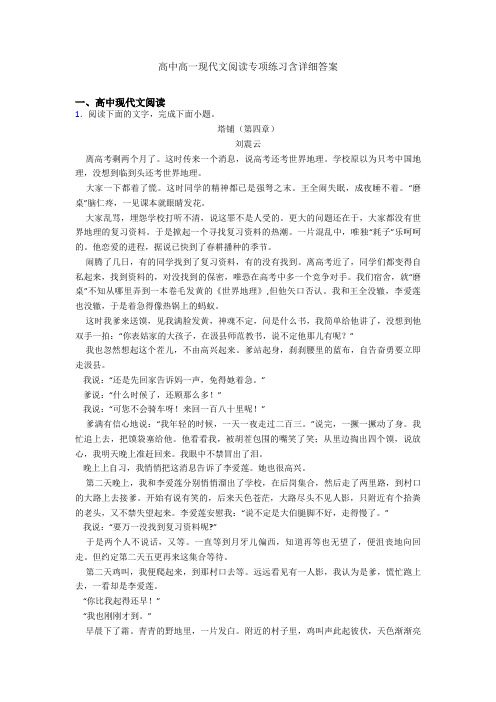
高中高一现代文阅读专项练习含详细答案一、高中现代文阅读1.阅读下面的文字,完成下面小题。
塔铺(第四章)刘震云离高考剩两个月了。
这时传来一个消息,说高考还考世界地理。
学校原以为只考中国地理,没想到临到头还考世界地理。
大家一下都着了慌。
这时同学的精神都已是强弩之末。
王全闹失眠,成夜睡不着。
“磨桌”脑仁疼,一见课本就眼睛发花。
大家乱骂,埋怨学校打听不清,说这罪不是人受的。
更大的问题还在于,大家都没有世界地理的复习资料。
于是掀起一个寻找复习资料的热潮。
一片混乱中,唯独“耗子”乐呵呵的。
他恋爱的进程,据说已快到了春耕播种的季节。
闹腾了几日,有的同学找到了复习资料,有的没有找到。
离高考近了,同学们都变得自私起来,找到资料的,对没找到的保密,唯恐在高考中多一个竞争对手。
我们宿舍,就“磨桌”不知从哪里弄到一本卷毛发黄的《世界地理》,但他矢口否认。
我和王全没辙,李爱莲也没辙,于是着急得像热锅上的蚂蚁。
这时我爹来送馍,见我满脸发黄,神魂不定,问是什么书,我简单给他讲了,没想到他双手一拍:“你表姑家的大孩子,在汲县师范教书,说不定他那儿有呢?”我也忽然想起这个茬儿,不由高兴起来。
爹站起身,刹刹腰里的蓝布,自告奋勇要立即走汲县。
我说:“还是先回家告诉妈一声,免得她着急。
”爹说:“什么时候了,还顾那么多!”我说:“可您不会骑车呀!来回一百八十里呢!”爹满有信心地说:“我年轻的时候,一天一夜走过二百三。
”说完,一撅一撅动了身。
我忙追上去,把馍袋塞给他。
他看看我,被胡茬包围的嘴笑了笑;从里边掏出四个馍,说放心,我明天晚上准赶回来。
我眼中不禁冒出了泪。
晚上上自习,我悄悄把这消息告诉了李爱莲。
她也很高兴。
第二天晚上,我和李爱莲分别悄悄溜出了学校,在后岗集合,然后走了两里路,到村口的大路上去接爹。
开始有说有笑的,后来天色苍茫,大路尽头不见人影,只附近有个拾粪的老头,又不禁失望起来。
李爱莲安慰我:“说不定是大伯腿脚不好,走得慢了。
”我说:“要万一没找到复习资料呢?”于是两个人不说话,又等。
【英语】高一英语阅读理解题20套(带答案)及解析
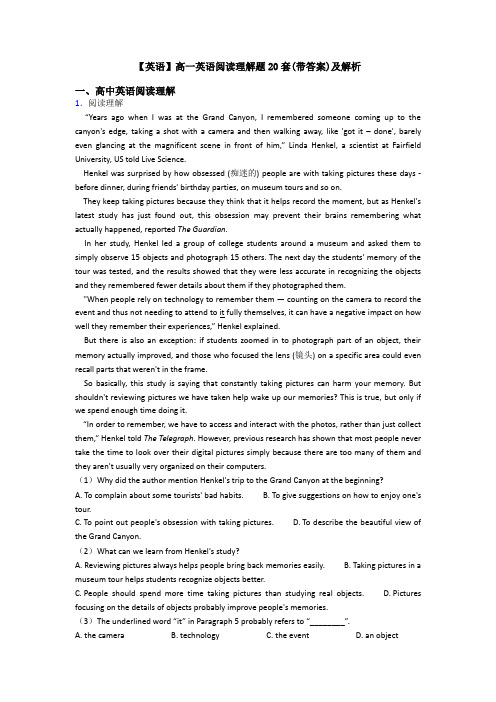
【英语】高一英语阅读理解题20套(带答案)及解析一、高中英语阅读理解1.阅读理解“Years ago when I was at the Grand Canyon, I remembered someone coming up to the canyon's edge, taking a shot with a camera and then walking away, like 'got it – done', barely even glancing at the magnificent scene in front of him,” Linda Henkel, a scientist at Fairfield University, US told Live Science.Henkel was surprised by how obsessed (痴迷的) people are with taking pictures these days - before dinner, during friends' birthday parties, on museum tours and so on.They keep taking pictures because they think that it helps record the moment, but as Henkel's latest study has just found out, this obsession may prevent their brains remembering what actually happened, reported The Guardian.In her study, Henkel led a group of college students around a museum and asked them to simply observe 15 objects and photograph 15 others. The next day the students' memory of the tour was tested, and the results showed that they were less accurate in recognizing the objects and they remembered fewer details about them if they photographed them.''When people rely on technology to remember them — counting on the camera to record the event and thus not needing to attend to it fully themselves, it can have a negative impact on how well they remember their experiences,” Henkel explained.But there is also an exception: if students zoomed in to photograph part of an object, their memory actually improved, and those who focused the lens (镜头) on a specific area could even recall parts that weren't in the frame.So basically, this study is saying that constantly taking pictures can harm your memory. But shouldn't reviewing pictures we have taken help wake up our memories? This is true, but only if we spend enough time doing it.“In order to remember, we have to access and interact with the photos, rather than just collect them,” Henkel told The Telegraph. However, previous research has shown that most people never take the time to look over their digital pictures simply because there are too many of them and they aren't usually very organized on their computers.(1)Why did the author mention Henkel's trip to the Grand Canyon at the beginning? A. To complain about some tourists' bad habits. B. To give suggestions on how to enjoy one's tour.C. To point out people's obsession with taking pictures.D. To describe the beautiful view of the Grand Canyon.(2)What can we learn from Henkel's study?A. Reviewing pictures always helps people bring back memories easily.B. Taking pictures in a museum tour helps students recognize objects better.C. People should spend more time taking pictures than studying real objects.D. Pictures focusing on the details of objects probably improve people's memories.(3)The underlined word “it” in Paragraph 5 probably refers to “________”.A. the cameraB. technologyC. the eventD. an object(4)What is the article mainly about?A. People's obsession with taking pictures and its influence.B. Possible ways of using pictures to improve one's memory.C. Great harm to memory caused by taking pictures constantly.D. A believable study into the negative impact of lining cameras often.【答案】(1)C(2)D(3)C(4)A【解析】【分析】本文是一篇议论文,人们都有拍照的喜好,拍照有助于我们记忆。
高一现代文阅读练习题及答案

高一现代文阅读练习题及答案阅读是培养学生语文综合素质的重要环节,现代文阅读练习题能够帮助学生提高阅读理解能力和文学鉴赏能力。
本篇文章将为您提供一些高一现代文阅读练习题及答案,希望对您的学习有所帮助。
阅读练习题一:小说《围城》的作者是谁?A. 鲁迅B. 韩寒C. 都江堰D. 钱钟书答案:D. 钱钟书解析:《围城》是中国现代文学的经典之作,由钱钟书所著。
这部小说以讽刺的手法揭示了上世纪40年代中国知识分子内心的挣扎和焦虑,描绘了当时社会的种种问题。
阅读练习题二:下列哪部作品不是鲁迅的代表作?A. 《狂人日记》B. 《呐喊》C. 《围城》D. 《莎菲女士的日记》答案:C. 《围城》解析:《围城》不是鲁迅的代表作,而是钱钟书的作品。
鲁迅的代表作包括《狂人日记》、《呐喊》等,他被誉为中国现代文学的奠基人之一,对于中国文学的发展产生了深远的影响。
阅读练习题三:请根据以下材料回答问题:(摘自《红楼梦》)贾母见他无精打采,说道:“你们两人这样的本分,还生什么悲痛!只是出落得这样模样,却又一面来向人沾惹寻歪!快休胡乱哭,娘儿们再伤心也不过是造孽!”紫鹃道:“……容他哭,伤一日心,可省得后来哭数月。
要是哭过了,往后娘儿们百般缠念他,他却又挑起来,娘儿们伤的心就枉然悔恨。
”低声对宝钗又说道:“一时他不恼,过后他也后悔。
也不见你好处。
”贾母便止了怎么唧唧的丫头说话。
问题:这段文字中主要描写了哪个人物的情感?A. 宝钗B. 贾母C. 紫鹃D. 贾宝玉答案:D. 贾宝玉解析:这段文字主要描写了贾宝玉的情感。
他因为某种原因而情绪低落,引起了贾母、紫鹃等人的关注和劝解。
这段文字中贾母和紫鹃的对话,既展现出他们对贾宝玉的关心,也暗示了贾宝玉的情感内心活动。
阅读练习题四:下面关于现代文学特点的表述,哪一项是正确的?A. 内容丰富,触及社会现实问题,倾向于现实主义风格。
B. 写作风格多样,包括传统文学的继承与创新。
C. 倾向于表现个人情感和心理世界,形成了显著的浪漫主义风格。
高一英语阅读理解试题(有答案和解析)及解析
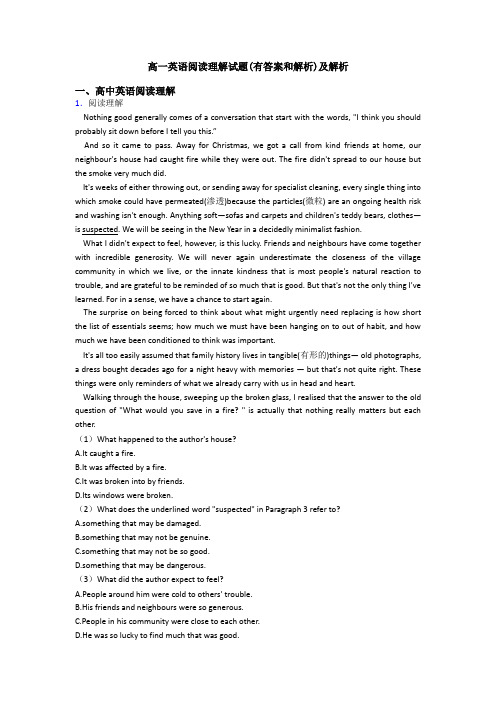
高一英语阅读理解试题(有答案和解析)及解析一、高中英语阅读理解1.阅读理解Nothing good generally comes of a conversation that start with the words, "I think you should probably sit down before I tell you this.”And so it came to pass. Away for Christmas, we got a call from kind friends at home, our neighbour's house had caught fire while they were out. The fire didn't spread to our house but the smoke very much did.It's weeks of either throwing out, or sending away for specialist cleaning, every single thing into which smoke could have permeated(渗透)because the particles(微粒) are an ongoing health risk and washing isn't enough. Anything soft—sofas and carpets and children's teddy bears, clothes—is suspected. We will be seeing in the New Year in a decidedly minimalist fashion.What I didn't expect to feel, however, is this lucky. Friends and neighbours have come together with incredible generosity. We will never again underestimate the closeness of the village community in which we live, or the innate kindness that is most people's natural reaction to trouble, and are grateful to be reminded of so much that is good. But that's not the only thing I've learned. For in a sense, we have a chance to start again.The surprise on being forced to think about what might urgently need replacing is how short the list of essentials seems; how much we must have been hanging on to out of habit, and how much we have been conditioned to think was important.It's all too easily assumed that family history lives in tangible(有形的)things— old photographs, a dress bought decades ago for a night heavy with memories — but that's not quite right. These things were only reminders of what we already carry with us in head and heart.Walking through the house, sweeping up the broken glass, I realised that the answer to the old question of "What would you save in a fire? " is actually that nothing really matters but each other.(1)What happened to the author's house?A.It caught a fire.B.It was affected by a fire.C.It was broken into by friends.D.Its windows were broken.(2)What does the underlined word "suspected" in Paragraph 3 refer to?A.something that may be damaged.B.something that may not be genuine.C.something that may not be so good.D.something that may be dangerous.(3)What did the author expect to feel?A.People around him were cold to others' trouble.B.His friends and neighbours were so generous.C.People in his community were close to each other.D.He was so lucky to find much that was good.(4)How will the author probably feel when the New Year finally comes?A.Worried.B.Surprised.C.Excited.D.Contented.【答案】(1)B(2)A(3)A(4)D【解析】【分析】本文是一篇记叙文,作者家房子受到火灾影响,物品受损,一切都需要清理,但朋友们和邻居们提供的帮助,让作者感受到了他们的善良,对他们感恩。
高一现代文阅读理解练习题及答案

高一现代文阅读理解练习题及答案1. 阅读下面的短文,回答问题。
人往往在看到美景时,会不由自主地发出赞叹,感到心旷神怡。
然而,令人不解的是,人们为何在看到美景时如此快乐,却无法保持这种快乐的持久。
哲学家们对此进行了深入的思考与研究,得出了以下的结论。
问题:为什么人们在看到美景时感到快乐,但无法持久?答案:哲学家们认为,人们在看到美景时的快乐是短暂的,无法持久的原因有以下几个方面。
首先,人们在看到美景时产生的快乐是一种身外之感。
美景是外在的事物,它们激发了人们感官上的享受和美的体验。
然而,这种快乐并非源于人的内心深处,而是来自于外界对人的刺激。
当美景消失或者人们离开美景时,这种快乐也会随之消失。
其次,人们在看到美景时的快乐是一种感官享受,并非内在的幸福。
美景往往会给人们带来视觉、听觉、嗅觉等多种感官上的愉悦。
然而,这种感官享受并不能真正满足人们内在的精神需求,它只是短暂地刺激了人们的感官,但并没有深入到人的灵魂深处。
最后,人们在看到美景时感到快乐的原因还在于美景给人们带来的一种对比效应。
美景往往与平凡的日常生活形成鲜明的对比,使人们感到愉悦和满足。
然而,这种对比效应也是短暂的,一旦人们适应了美景,它们就会变得平凡,人们很快就会失去对美景的敏感和快乐。
综上所述,人们在看到美景时感到快乐但无法持久的原因主要在于这种快乐是短暂的、身外之感的、感官享受的,并且受到对比效应的影响。
人们想要获得持久的快乐,就需要超越感官享受,深入到内心深处,找到真正属于自己的幸福和快乐。
2. 阅读下面的短文,回答问题。
爱情是人类永恒的话题,许多作家都将爱情描绘成美好而又复杂的情感。
然而,对于爱情,人们往往会陷入纠结和矛盾之中。
下面是一个与爱情相关的问题。
问题:爱情为什么会让人们陷入纠结和矛盾?答案:爱情让人们陷入纠结和矛盾的原因有以下几个方面。
首先,爱情带来的情感起伏让人们难以抉择。
爱情是一种复杂而又强烈的情感,它会引发人们极大的快乐和悲伤。
阅读试题高一语文及答案

阅读试题高一语文及答案一、阅读理解(共40分)1. 阅读下面的文章,完成下列各题。
(20分)(1)文章中提到的“他”在故事中扮演了什么角色?(5分)答案:在故事中,“他”扮演了一位智者的角色,通过他的智慧和经验,引导主人公解决问题。
(2)请简述文章中“她”的情感变化过程。
(5分)答案:文章中的“她”最初感到迷茫和无助,随着故事的发展,她逐渐变得坚强和自信,最终找到了解决问题的方法。
(3)文章中“他们”是如何克服困难的?(10分)答案:文章中的“他们”通过团结合作、坚持不懈以及互相鼓励,最终克服了困难,实现了目标。
2. 阅读下面的诗歌,完成下列各题。
(20分)(1)诗歌中“春风”象征着什么?(5分)答案:诗歌中的“春风”象征着新生和希望,它预示着万物复苏和生命的开始。
(2)诗人在诗中表达了怎样的情感?(5分)答案:诗人在诗中表达了对美好生活的向往和对自然美景的赞美之情。
(3)请分析诗歌中的修辞手法及其作用。
(10分)答案:诗歌中运用了拟人、比喻等修辞手法,通过这些手法,诗人赋予了自然景物以生命和情感,增强了诗歌的感染力和艺术表现力。
二、现代文阅读(共30分)1. 阅读下面的文章,完成下列各题。
(15分)(1)文章的主旨是什么?(5分)答案:文章的主旨是探讨人与自然和谐共生的重要性。
(2)作者通过哪些事例来支持自己的观点?(5分)答案:作者通过描述环境污染、生态破坏等事例来支持自己的观点。
(3)文章中提到的“绿色发展”是什么意思?(5分)答案:文章中提到的“绿色发展”指的是在经济发展的同时,注重环境保护和资源节约,实现可持续发展。
2. 阅读下面的议论文,完成下列各题。
(15分)(1)文章的论点是什么?(5分)答案:文章的论点是教育应该注重培养学生的创新能力和实践能力。
(2)作者使用了哪些论证方法?(5分)答案:作者使用了举例论证、对比论证和因果论证等方法。
(3)文章中提到的“终身学习”对个人发展有什么意义?(5分)答案:文章中提到的“终身学习”意味着个人应该持续不断地学习新知识、新技能,以适应社会的发展和变化,对个人的职业发展和生活质量有着重要的意义。
高一语文试题及答案解析

高一语文试题及答案解析一、现代文阅读(共36分)阅读下面的文字,完成1-3题。
(共18分)《荷塘月色》节选朱自清路上只我一个人,背着手踱着。
这一片天地好像是我的;我也像超出了平常的自己,到了另一个世界里。
我爱热闹,也爱冷静;爱群居,也爱独处。
像今晚上,一个人在这苍茫的月下,什么都可以想,什么都可以不想,便觉是个自由的人。
白天里一定要做的事,一定要说的话,现在都可不理。
这是独处的妙处;我且受用这无边的荷香月色好了。
曲曲折折的荷塘上面,弥望的是田田的叶子。
叶子出水很高,像亭亭的舞女的裙。
层层的叶子中间,零星地点缀着些白花,有袅娜地开着的,有羞涩地打着朵儿的;正如一粒粒的明珠,又如碧天里的星星,又如刚出浴的美人。
微风过处,送来缕缕清香,仿佛远处高楼上渺茫的歌声似的。
这时候叶子与花也有一丝的颤动,像闪电般,霎时传过荷塘的那边去了。
叶子本是肩并肩密密地挨着,这便宛然有了一道凝碧的波痕。
叶子底下是脉脉的流水,遮住了,不能见一些颜色;而叶子却更见风致了。
月光如流水一般,静静地泻在这一片叶子和花上。
薄薄的青雾浮起在荷塘里。
叶子和花仿佛在牛乳中洗过一样;又像笼着轻纱的梦。
虽然是满月,天上却有一层淡淡的云,所以不能朗照;但我以为这恰是到了好处——酣眠固不可少,小睡也别有风味的。
月光是隔了树照过来的,高处丛生的灌木,落下参差的斑驳的黑影,峭楞楞如鬼一般;弯弯的杨柳的稀疏的倩影,却又像是画在荷叶上。
塘中的月色并不均匀;但光与影有着和谐的旋律,如梵婀玲上奏着的名曲。
1. 作者在文中描绘了哪些景物?请简要概括。
(6分)答案解析:作者在文中描绘了荷塘、荷叶、荷花、微风、清香、流水、月光、青雾、树影等景物。
这些景物共同构成了一幅宁静、美丽的荷塘月色图。
2. 作者在文中表达了怎样的情感?请简要分析。
(6分)答案解析:作者在文中表达了对荷塘月色美景的热爱和赞美之情,以及对独处时自由自在、无拘无束的向往。
通过对荷塘月色的细腻描绘,作者传达了对自然美景的热爱和对生活的感悟。
高一阅读题练习及答案详解讲解实用资料

高一阅读题练习及答案详解解实用资料(可以直接使用,可编辑优秀版资料,欢迎下载)泥土的声音①我又听到了泥土的声音。
②匍匐在绿草茸茸的田埂上,我喃喃着,我甚至用手紧紧地攥起一把水涔涔的黝亮黝亮的泥土,我凝视着,几乎是贪婪般地嗅着那久违了的气息,我分明听到了泥土细腻而真实的呢喃声。
我合掌,侧耳良久,然后我张开掌,泥土又顺着手心落下,那一捧泥土又漫开去。
一阵令人心悸般的惬意透过手心浸入心脾。
人,似乎无端地就舒坦起来。
③我抬头仰望着碧蓝的天空,此时,天空一尘不染。
而遥远处山峦逶逶迤迤,像一幅写意画,线条像被水墨泼着,渗浸无痕。
眼前是一眼望不见尽头的橙绿,近处的稻穗已是摇摇曳曳。
满眼的青和橙绿,这是多年已没有过的哦,我的心兀然就颤栗起来。
然后,头又俯下去,我几乎是贴在茸茸的草地上,我被无边无垠的橙绿湮没了。
我又听到泥土细细的声音,那声音轻轻的,那么幽悠,那样静穆,那般叫人无法言说,只有用心匍匐在土地上才能听到。
④稻穗抽出来了,趋于成熟。
我坐起来,我看着西天边那轮爽朗的落日。
我抚摸着已有些蕊花的稻穗和叶子,我摇了一下,便搅动了一团幽香,青青的,泛泛的。
我狂躁不安的心此时完全安顿下来,久居都市被尘嚣侵扰的心灵,陡地就回归到宁静中,虚空的心被眼前的景象充盈着。
⑤在一轮落日的霞光里两个大叔扛着锄头走过来,他们在不远处停下。
我听到他们的对话,他们说,要晒田了,稻要熟了。
他们用锄头就给田埂开了一个缺口。
我听见他们用脚还在泥土上跺了跺。
他们的裤管高高卷起来,然后拄着锄头在絮说着,他们的对话简洁,交谈中有爽朗的和憨厚的笑,我虽然没有听见他们说什么,但我明白他们的交谈绝对与名利、权力无关,我晓得他们多半说着他们眼前的庄稼。
⑥这是我儿时曾有的记忆。
这幅景象越发让我感动,我眼里几乎噙着泪水,这记忆使我于艰难苦涩时嚼之如饴。
我似乎看到泥土被犁头一浪一浪翻开,跳跃着令人心颤的黑亮黑亮的光泽。
牛,是弓着背的;犁也是弓着的;庄稼人也是弓着的。
高一英语阅读理解题20套(带答案)及解析
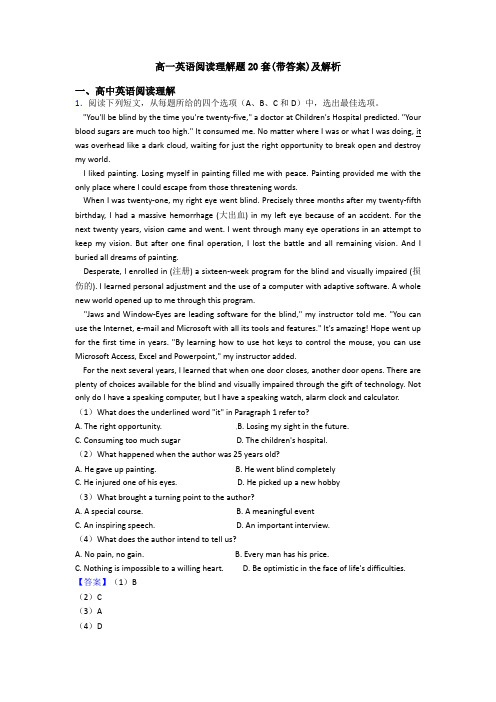
高一英语阅读理解题20套(带答案)及解析一、高中英语阅读理解1.阅读下列短文,从每题所给的四个选项(A、B、C和D)中,选出最佳选项。
"You'll be blind by the time you're twenty-five," a doctor at Children's Hospital predicted. "Your blood sugars are much too high." It consumed me. No matter where I was or what I was doing, it was overhead like a dark cloud, waiting for just the right opportunity to break open and destroy my world.I liked painting. Losing myself in painting filled me with peace. Painting provided me with the only place where I could escape from those threatening words.When I was twenty-one, my right eye went blind. Precisely three months after my twenty-fifth birthday, I had a massive hemorrhage (大出血) in my left eye because of an accident. For the next twenty years, vision came and went. I went through many eye operations in an attempt to keep my vision. But after one final operation, I lost the battle and all remaining vision. And I buried all dreams of painting.Desperate, I enrolled in (注册) a sixteen-week program for the blind and visually impaired (损伤的). I learned personal adjustment and the use of a computer with adaptive software. A whole new world opened up to me through this program."Jaws and Window-Eyes are leading software for the blind," my instructor told me. "You can use the Internet, e-mail and Microsoft with all its tools and features." It's amazing! Hope went up for the first time in years. "By learning how to use hot keys to control the mouse, you can use Microsoft Access, Excel and Powerpoint," my instructor added.For the next several years, I learned that when one door closes, another door opens. There are plenty of choices available for the blind and visually impaired through the gift of technology. Not only do I have a speaking computer, but I have a speaking watch, alarm clock and calculator.(1)What does the underlined word "it" in Paragraph 1 refer to?A. The right opportunity.B. Losing my sight in the future.C. Consuming too much sugarD. The children's hospital.(2)What happened when the author was 25 years old?A. He gave up painting.B. He went blind completelyC. He injured one of his eyes.D. He picked up a new hobby(3)What brought a turning point to the author?A. A special course.B. A meaningful eventC. An inspiring speech.D. An important interview.(4)What does the author intend to tell us?A. No pain, no gain.B. Every man has his price.C. Nothing is impossible to a willing heart.D. Be optimistic in the face of life's difficulties.【答案】(1)B(2)C(3)A(4)D【解析】【分析】本文是一篇记叙文。
高一英语阅读理解试题(有答案和解析)及解析
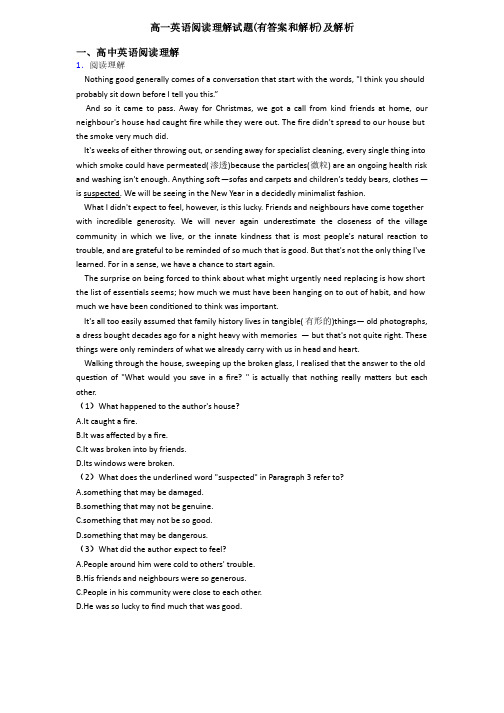
高一英语阅读理解试题(有答案和解析)及解析
一、高中英语阅读理解
1.阅读理解 Nothing good generally comes words, "I think you should
probably sit down before I tell you this.” And so it came to pass. Away for Christmas, we got a call from kind friends at home, our
Walking through the house, sweeping up the broken glass, I realised that the answer to the old ques on of "What would you save in a fire? " is actually that nothing really ma ers but each other. (1)What happened to the author's house? A.It caught a fire. B.It was affected by a fire. C.It was broken into by friends. D.Its windows were broken. (2)What does the underlined word "suspected" in Paragraph 3 refer to? A.something that may be damaged. B.something that may not be genuine. C.something that may not be so good. D.something that may be dangerous. (3)What did the author expect to feel? A.People around him were cold to others' trouble. B.His friends and neighbours were so generous. C.People in his community were close to each other. D.He was so lucky to find much that was good.
高一阅读题练习及答案详解讲解

阅读下面的文字,完成后面题目。
(20分)青春之门赵东①我是一个喜欢在人家门前徘徊的孩子,无意间看见的小花猫或蓝风铃什么的,都会引逗得我在人家门口默默地望上半天。
我的一双眼睛以外永远是一扇门,把自己内心世界与外面的大世界隔绝开来,于是心中就总是酝酿着孩提时代的那种清纯,于是眼睛就总是贪婪地向门外张望。
②从前一直认为那扇门很大,大得连风雨都推不动。
那时门里只有爸爸、妈妈、姐姐和玩具熊,一本旧旧的连环画早就翻烂了;;一段关于公主与巫婆的故事早就听腻了……可门却关得那么严,我出不去。
只好经常站在窗前,夏天看窗外的白鹭在云里钻来钻去,心儿便也插上翅膀飞出大门;冬天在窗花上模仿各种野兽在雪地中的脚印,每一串脚印都跳到了门外……懂事的时候,我就试图接近那扇门,有时间就与它培养感情,跟它说话,给它唱歌,向它做鬼脸儿……可是不论我怎样讨好,它都不理我,它离我好远呵!③后来,我可能是长大了,在某年某月的某一天,那扇门竟訇然地向我敞开了。
我一下子仿佛置身于另一个清新的世界。
跑呵跳呵,朋友也多起来,调皮的鸟,溢香的花,青翠的山,幽蓝的湖,还有伙伴的友情,对知识的求索,对异性那种神秘而清纯的爱慕……排山倒海地向我推来。
穿越过一段时间的隧道,我终于跨过了这扇既陌生又熟悉的大门。
④由小男孩迅速长成个小伙子,这不能不算是大自然对自己的慷慨。
那扇绚丽芬芳的五彩门已经被丢在身后了,喜欢在门前徘徊的我,突然像失去了什么,周围是一片空蒙寂寥,于是便发现了自己的孤独。
总想把甜密和痛苦都揉进梦里,让一个清丽修长的身影夜夜光着脚熨干我潮湿的情绪:总想把静谧和骚动都捏进指缝,让一个绵软的笑时时眯着眼流入我荒凉的田野。
⑤这就是我所踏上的青春的阶梯吗?这样的年龄悄悄地来了,这样的季节悄悄地来了,谁也无法拒绝,谁也无法回避。
青春的门应该是属于诗的,它不仅奔流着执著的血浆,还燃烧着热情的生命。
清晨,我在它的呼唤中醒来;夜晚,我在它的抚慰中睡去;仅仅是在短暂的瞬间,我便迎来了青春之门,我便告别了青春之门,向人生的又一新领域奋力攀登。
高一语文阅读理解试题
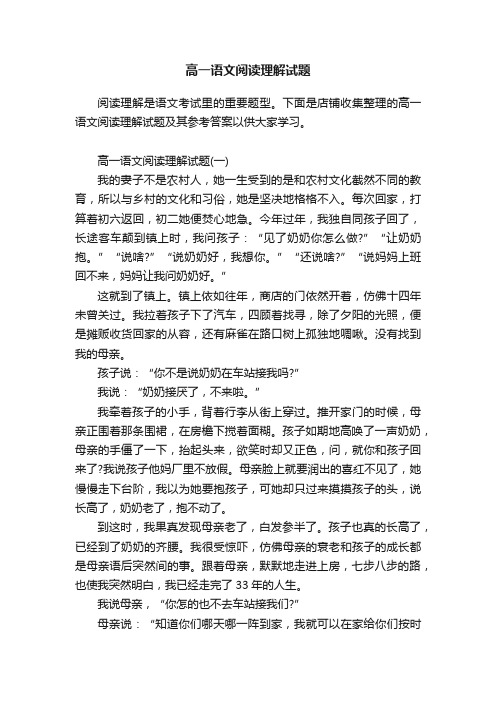
高一语文阅读理解试题阅读理解是语文考试里的重要题型。
下面是店铺收集整理的高一语文阅读理解试题及其参考答案以供大家学习。
高一语文阅读理解试题(一)我的妻子不是农村人,她一生受到的是和农村文化截然不同的教育,所以与乡村的文化和习俗,她是坚决地格格不入。
每次回家,打算着初六返回,初二她便焚心地急。
今年过年,我独自同孩子回了,长途客车颠到镇上时,我问孩子:“见了奶奶你怎么做?”“让奶奶抱。
”“说啥?”“说奶奶好,我想你。
”“还说啥?”“说妈妈上班回不来,妈妈让我问奶奶好。
”这就到了镇上。
镇上依如往年,商店的门依然开着,仿佛十四年未曾关过。
我拉着孩子下了汽车,四顾着找寻,除了夕阳的光照,便是摊贩收货回家的从容,还有麻雀在路口树上孤独地啁啾。
没有找到我的母亲。
孩子说:“你不是说奶奶在车站接我吗?”我说:“奶奶接厌了,不来啦。
”我牵着孩子的小手,背着行李从街上穿过。
推开家门的时候,母亲正围着那条围裙,在房檐下搅着面糊。
孩子如期地高唤了一声奶奶,母亲的手僵了一下,抬起头来,欲笑时却又正色,问,就你和孩子回来了?我说孩子他妈厂里不放假。
母亲脸上就要润出的喜红不见了,她慢慢走下台阶,我以为她要抱孩子,可她却只过来摸摸孩子的头,说长高了,奶奶老了,抱不动了。
到这时,我果真发现母亲老了,白发参半了。
孩子也真的长高了,已经到了奶奶的齐腰。
我很受惊吓,仿佛母亲的衰老和孩子的成长都是母亲语后突然间的事。
跟着母亲,默默地走进上房,七步八步的路,也使我突然明白,我已经走完了33年的人生。
我说母亲,“你怎的也不去车站接我们?”母亲说:“知道你们哪天哪一阵到家,我就可以在家给你们按时烧饭了,不用接了。
”说话时,母亲用身子挨着她的孙子,问:“在家住几天?”我说:“过完正月十五。
”她说:“半个月?”我说:“十六天。
”“当兵十多年,你还从没在家住过这么长时间哩。
”母亲这样说着,就往灶房去了,小小一阵后,端来了两碗鸡蛋面汤,让我和孩子吃着,自己去包了饺子。
高一语文试题及答案

高一语文试题及答案试题一:文言文阅读阅读下面的文言文,完成1-4题。
《左传·宣公十五年》宣公十五年春,晋师伐郑。
郑人使子产如晋,晋人执之。
子产曰:“吾闻君子不以人之罪,而害其身。
今晋以郑之罪,而执我,是害我身也。
”晋人释之。
1. 解释文中加点词的词义。
- 执:()- 闻:()2. 翻译文中划线句子。
- “吾闻君子不以人之罪,而害其身。
”的意思是:3. 子产在文中表现出了怎样的品质?4. 根据文本内容,简述晋人为何最终释放了子产。
试题二:现代文阅读阅读下面的现代文,完成5-8题。
《窗外》窗外,是一片繁华的世界。
高楼大厦,车水马龙,人来人往。
然而,在这喧嚣之中,我更喜欢静静地坐在窗前,观察着这个世界的每一个角落。
5. 作者在文中描绘了怎样的景象?6. 作者为什么更喜欢静静地坐在窗前?7. 请分析文中“窗外”一词的象征意义。
8. 根据你对文章的理解,你认为作者想要传达什么主题?试题三:作文9. 以“时间的价值”为题,写一篇不少于800字的议论文。
答案:1. 执:拘留、扣留;闻:听说、知道。
2. “吾闻君子不以人之罪,而害其身。
”意思是:我听说君子不会因为别人的罪过而伤害自己。
3. 子产表现出了机智和勇敢的品质,他以君子之道来反驳晋人的行为,展现了他的聪明和胆识。
4. 晋人最终释放了子产,可能是因为他们认识到了子产的话中的道理,或者被他的言辞所打动,从而改变了主意。
5. 作者描绘了窗外繁华的城市景象,包括高楼大厦、车水马龙和人来人往。
6. 作者更喜欢静静地坐在窗前,可能是因为他想远离喧嚣,寻找内心的宁静。
7. “窗外”一词在文中象征着外部世界,与作者内心的宁静形成对比。
8. 作者可能想要传达的主题是:在快节奏的现代生活中,人们需要找到属于自己的宁静之地,以保持内心的平和。
9. 作文部分需考生自行发挥,围绕“时间的价值”这一主题进行论述。
高一语文阅读理解例题及答案详解

高一语文阅读理解例题及答案详解阅读下面的文字,完成后面题。
幸福号飞碟桂花飘香的秋日上午八时,一架巨型飞碟,在雷鸣般的欢呼声中,旋转着七色光芒,降落于某大学樱花广场。
一位小绿人,高高站在飞碟门口,派头十足地发表了讲话。
“各位,各位,我们是幸福号飞碟,来自遥远的S星体,我们肩负和平使命、怀着诚挚的情感而来。
我们深知你们不少人对生活日感厌倦,认为活着差不多只是一种负担,深切渴望到一个轻松自在、舒服富裕且充满刺激的地方去。
现在,我来了,我来了,我来接你们了!”“各位,一切都不需要,不要签证,不要担保人,不要资质证明,不要美元,一切都不需要,只要马上走出来的勇气。
幸福就在眼前,就在举手投足之间,快快走出来吧,不要失之交臂,要知道:摆在你们面前的是超豪华飞碟,是享誉宇宙的幸福号飞碟,你们所要到达的将是比你们地球文明发达数亿光年的全新的文明星体。
”“呵,五个人走出来了,很好。
又有三十八个,啊,甚至还有十九名女性,太棒了,太棒了。
九十八个,一百九十一个,二百五十个,好,够了!开放光电梯!”从七层楼高的飞碟的舷窗,立刻喷出一条条彩虹般波荡的光电梯。
二百余名男女在徜恍迷离中,如长袖飘曳的飞天被摄入飞碟,那滋味真是好极了。
飞碟随即上升,转眼间便消失于时空走廊。
“各位,各位,现在由我——XXX来回答大家所关心的问题。
”还是那位小绿人说。
XXX的XXX先生说:“XXX,老话说,民以食为天,到贵国之后不见得会让我们饿肚皮吧。
”XXX笑道:“哦,您真是太幽默了,各位是尊贵的客人,放心放心,你们永远不会有半点饥饿的感觉!”穿着露脐裤的XXX道:“请问,你的国家美丽吗?能为我们提供游览你们国家的机会吗?”老K道:“小姐,你们讲游遍我们的星球。
事实上你们将会接连不断地在各个城市间游动!”西装笔挺的XXX说:“我想询问一下住房,五室三厅或七室五厅都好商量,问题是要绝对安全。
”XXX道:“你们的住房坚固无比,安全是绝对的。
”XXX道:“我希望能干某种尽可能轻松且不复杂的工作,要知道,我们可都是本国的精英啊。
高一语文现代文试题及答案

高一语文现代文试题及答案一、阅读理解(共40分)阅读下面的文章,完成1-4题。
文章文章内容:在时间的长河里,我们每个人都不过是一粒微小的沙粒。
时间,它无情地流逝,带走了青春,也带来了成熟。
它像是一把刻刀,雕刻着每个人的生命轨迹。
有的人在时间的洪流中迷失了方向,有的人却能在时间的考验中找到自我。
1. 文章中提到的“时间的重量”指的是什么?(5分)2. 作者通过哪些比喻来描述时间?(5分)3. 文章中提到的“有的人”具体指的是哪些人?(10分)4. 根据文章内容,你认为作者想要传达的中心思想是什么?(20分)二、现代文阅读分析(共30分)阅读下面的文章,完成5-7题。
文章标题:《窗外的春天》文章内容:春天来了,窗外的景色变得格外迷人。
嫩绿的树叶在微风中摇曳,小鸟在枝头欢快地歌唱。
孩子们在草地上奔跑,笑声充满了整个小区。
春天,是万物复苏的季节,也是希望的开始。
5. 根据文章内容,描述一下春天的特点。
(10分)6. 文章中提到的“希望的开始”具体指的是什么?(10分)7. 你认为作者通过描绘春天的景象想要表达什么主题?(10分)三、现代文写作(共30分)根据以下提示,写一篇不少于800字的现代文。
提示:随着科技的发展,人们的生活发生了翻天覆地的变化。
请以“科技改变生活”为题,写一篇文章,描述科技如何影响我们的生活,并谈谈你的看法。
参考答案:一、阅读理解1. “时间的重量”指的是时间对人生的影响和价值。
(5分)2. 作者通过“长河”、“刻刀”等比喻来描述时间。
(5分)3. “有的人”指的是在时间的流逝中,有的迷失方向,有的找到自我的人。
(10分)4. 作者想要传达的中心思想是:我们应该珍惜时间,利用时间来实现自我价值。
(20分)二、现代文阅读分析5. 春天的特点包括万物复苏、生机勃勃、景色迷人等。
(10分)6. “希望的开始”指的是春天的到来象征着新的开始和希望。
(10分)7. 作者通过描绘春天的景象想要表达的主题是生命的活力和希望。
(英语)高一英语阅读理解专题训练答案及解析
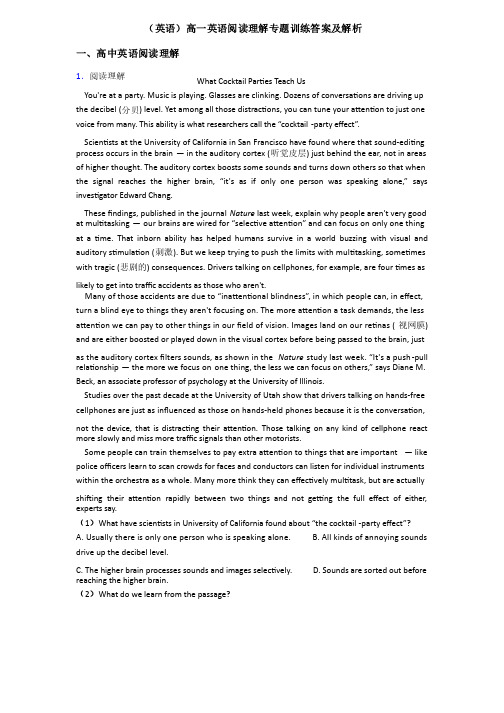
the decibel (分贝) level. Yet among all those distrac ons, you can tune your a en on to just one
voice from many. This ability is what researchers call the “cocktail -party effect”.
not the device, that is distrac ng their a en on. Those talking on any kind of cellphone react more slowly and miss more traffic signals than other motorists.
These findings, published in the journal Nature last week, explain why people aren't very good at mul tasking — our brains are wired for “selec ve a en on” and can focus on only one thing at a me. That inborn ability has helped humans survive in a world buzzing with visual and auditory s mula on (刺激). But we keep trying to push the limits with mul tasking, some mes
accident because of phubbiБайду номын сангаасg(低头).
(4)The main purpose of the passage is to ______.
高一语文阅读理解及答案

【导语】在⾼⼀的学习过程中,做好每⼀道阅读理解题,有利于我们提⾼学习成绩。
下⾯是⽆忧考收集整理的⾼⼀语⽂阅读理解题⽬及其参考答案以供⼤家学习。
⾼⼀语⽂阅读理解(⼀) 我曾经想过,如若⼈们开始爱惜光阴,那末他的⽣命的积储是有—部分耗蚀的了。
年青⼈往往不知珍惜光阴,犹如拥资巨万的富家⼦,他可以任意挥霍他的钱财,等到黄⾦垂尽便吝啬起来,⽽懊悔从前的浪费了。
最近的⼀个秋⽇的傍晚,我在近郊散步,我迎着苍黄的落⽇⾛过去,复背着它的光辉⾛回来,⾜踩着⾃⼰的影⼦。
“我是牵着我的思想在散步,”我对⾃⼰说,“我是踪蹑着我的影⼦,看我赶不赶得过它?”我携着我的思想⼀同散步。
它是羞怯得畏见阳光,⽼躲在我的影⼦⾥。
使得我和它谈话,不得不偏过头去,伛偻着⾝⼦,正如⼀个⾼⼤的男⼦低头和⾝边的⼥⼦说话,是那么轻声地,絮絮地。
我们⾛着⾛着,不知从哪⾥来的⼀枚树叶,飘坠在我们的脚前。
那样轻,怕跌碎的样⼦。
要不是四周是那么静寂,我准不会注意。
但我注意到了,我捡了起来,我试想分辨它是什么树叶?梧桐的,枫树的,还是樗栎的?但我恍若看到这不是⼀张树叶,分明是⼀张⽇历,⼀张被不可见的⼿扯下来的⽇历。
这上⾯写着的是⼀个⽆形的字:“秋。
” “秋!”我微喟⼀声。
“秋,秋。
”我的思想躲在我的影⼦⾥和答我。
我感到有点迟暮了。
好像这个字代表⼀段逝去的光阴。
“逝去的光阴。
”我的思想如刁钻的精灵,摸着了我的⼼思。
“光……阴。
”这两个平声的没有低昂的字眼,在我的⽿边震响。
光阴要逝去么?却借落叶通知我。
我岂不曾拥有过⼤量的光阴,这年青⼈的财产,⼀如富贾之⼦拥有巨资。
我曾是光阴富有者。
同时我也想起了两个惜阴的⼈。
正是这样秋暖的⽇⼦,在很早很早以前。
家门前的⽲场上排列着⼀⾏⾏的⾕簟,在阳光下曝晒着⽥⾥新收割来的⾕粒。
芙蓉花盛开着。
我坐在它的荫下,坐在⼀只⽵箩⾥⾯——我的⾝⼦还装不满⼀⽵箩——玩着⾕堆⾥捉来的蚱蜢螳螂和甲⾍,我玩着玩着,⽆意识地玩去我的光阴。
高中高一现代文阅读专项练习含详细答案
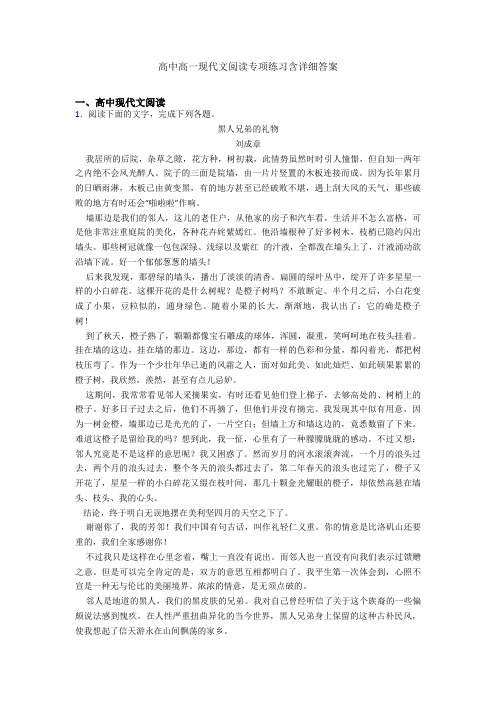
高中高一现代文阅读专项练习含详细答案一、高中现代文阅读1.阅读下面的文字,完成下列各题。
黑人兄弟的礼物刘成章我居所的后院,杂草之隙,花方种,树初栽,此情势虽然时时引人憧憬,但自知一两年之内绝不会风光醉人。
院子的三面是院墙,由一片片竖置的木板连接而成。
因为长年累月的日晒雨淋,木板已由黄变黑,有的地方甚至已经破败不堪,遇上刮大风的天气,那些破败的地方有时还会“啪啦啦”作响。
墙那边是我们的邻人,这儿的老住户,从他家的房子和汽车看,生活并不怎么富格,可是他非常注重庭院的美化,各种花卉姹紫嫣红。
他沿墙根种了好多树木,枝梢已隐约闪出墙头。
那些树冠就像一包包深绿、浅绿以及紫红的汁液,全都泼在墙头上了,汁液涌动欲沿墙下流。
好一个郁郁葱葱的墙头!后来我发现,那碧绿的墙头,播出了淡淡的清香。
扁圆的绿叶丛中,绽开了许多星星一样的小白碎花。
这棵开花的是什么树呢?是橙子树吗?不敢断定。
半个月之后,小白花变成了小果,豆粒似的,通身绿色。
随着小果的长大,渐渐地,我认出了:它的确是橙子树!到了秋天,橙子熟了,颗颗都像宝石雕成的球体,浑圆,凝重,笑呵呵地在枝头挂着。
挂在墙的这边,挂在墙的那边。
这边,那边,都有一样的色彩和分量,都闪着光,都把树枝压弯了。
作为一个少壮年华已逝的风霜之人,面对如此美、如此灿烂、如此硕果累累的橙子树,我欣然,羨然,甚至有点儿忌妒。
这期间,我常常看见邻人采摘果实,有时还看见他们登上梯子,去够高处的、树梢上的橙子。
好多日子过去之后,他们不再摘了,但他们并没有摘完。
我发现其中似有用意,因为一树金橙,墙那边已是光光的了,一片空白;但墙上方和墙这边的,竟悉数留了下来。
难道这橙子是留给我的吗?想到此,我一怔,心里有了一种朦朦胧胧的感动。
不过又想:邻人究竟是不是这样的意思呢?我又困惑了。
然而岁月的河水滚滚奔流,一个月的浪头过去,两个月的浪头过去,整个冬天的浪头都过去了,第二年春天的浪头也过完了,橙子又开花了,星星一样的小白碎花又缀在枝叶间,那几十颗金光耀眼的橙子,却依然高悬在墙头、枝头、我的心头。
- 1、下载文档前请自行甄别文档内容的完整性,平台不提供额外的编辑、内容补充、找答案等附加服务。
- 2、"仅部分预览"的文档,不可在线预览部分如存在完整性等问题,可反馈申请退款(可完整预览的文档不适用该条件!)。
- 3、如文档侵犯您的权益,请联系客服反馈,我们会尽快为您处理(人工客服工作时间:9:00-18:30)。
阅读下面的文字,完成后面题目。
(20分)青春之门赵东①我是一个喜欢在人家门前徘徊的孩子,无意间看见的小花猫或蓝风铃什么的,都会引逗得我在人家门口默默地望上半天。
我的一双眼睛以外永远是一扇门,把自己内心世界与外面的大世界隔绝开来,于是心中就总是酝酿着孩提时代的那种清纯,于是眼睛就总是贪婪地向门外张望。
②从前一直认为那扇门很大,大得连风雨都推不动。
那时门里只有爸爸、妈妈、姐姐和玩具熊,一本旧旧的连环画早就翻烂了;;一段关于公主与巫婆的故事早就听腻了……可门却关得那么严,我出不去。
只好经常站在窗前,夏天看窗外的白鹭在云里钻来钻去,心儿便也插上翅膀飞出大门;冬天在窗花上模仿各种野兽在雪地中的脚印,每一串脚印都跳到了门外……懂事的时候,我就试图接近那扇门,有时间就与它培养感情,跟它说话,给它唱歌,向它做鬼脸儿……可是不论我怎样讨好,它都不理我,它离我好远呵!③后来,我可能是长大了,在某年某月的某一天,那扇门竟訇然地向我敞开了。
我一下子仿佛置身于另一个清新的世界。
跑呵跳呵,朋友也多起来,调皮的鸟,溢香的花,青翠的山,幽蓝的湖,还有伙伴的友情,对知识的求索,对异性那种神秘而清纯的爱慕……排山倒海地向我推来。
穿越过一段时间的隧道,我终于跨过了这扇既陌生又熟悉的大门。
④由小男孩迅速长成个小伙子,这不能不算是大自然对自己的慷慨。
那扇绚丽芬芳的五彩门已经被丢在身后了,喜欢在门前徘徊的我,突然像失去了什么,周围是一片空蒙寂寥,于是便发现了自己的孤独。
总想把甜密和痛苦都揉进梦里,让一个清丽修长的身影夜夜光着脚熨干我潮湿的情绪:总想把静谧和骚动都捏进指缝,让一个绵软的笑时时眯着眼流入我荒凉的田野。
⑤这就是我所踏上的青春的阶梯吗?这样的年龄悄悄地来了,这样的季节悄悄地来了,谁也无法拒绝,谁也无法回避。
青春的门应该是属于诗的,它不仅奔流着执著的血浆,还燃烧着热情的生命。
清晨,我在它的呼唤中醒来;夜晚,我在它的抚慰中睡去;仅仅是在短暂的瞬间,我便迎来了青春之门,我便告别了青春之门,向人生的又一新领域奋力攀登。
仅仅是在短短的路途中,便留下了一生中最多最多的回忆……⑥想停下来深情的沉湎一番,怎奈行驶的船却没有铁锚;想回过头去重温旧梦,怎标身后早没有了归途。
因为时间的钟摆一刻也不曾停顿过,所以使命便赋予我们将在汹涌的大潮之中不停地颠簸。
⑦生命不是一张永远旋转的唱片;青春也不是一张永远不老的容颜。
爱情是一个永恒的故事,从冬说到夏,又从绿说到黄;步履是一个载着命运的轻舟,由南驶向北,又由近驶向远……你看到那阳光明媚、金色羽毛升起的地方,矗立在歌吟里、掩映在诗词中的不分明是一扇神奇玄妙的青春之门吗?⑧人生就像小姑娘跳方格格一样,无论愿不愿意,都必须跨过这一扇又一扇庄严的大门。
1.根据语句特点,在第②段横线上写一句符合语境的话。
(4分)2.这篇抒情散文“青春之门”为题,却从孩提生活入手,这样写的好处是什么?(4分)3.作者在抒发自己对青春的体悟时,紧扣“迎来”和“告别”两个阶段交替组织材料,抒发情感,结合③④两段,分析作者在这两个阶段中所抒发的主要感受是什么?(6分)4.在第⑦自然段中,作者说“青春也不是一张永远不老的容颜”,结合上下文,说说这个比喻的含义和用意。
(6分)泥土的声音①我又听到了泥土的声音。
②匍匐在绿草茸茸的田埂上,我喃喃着,我甚至用手紧紧地攥起一把水涔涔的黝亮黝亮的泥土,我凝视着,几乎是贪婪般地嗅着那久违了的气息,我分明听到了泥土细腻而真实的呢喃声。
我合掌,侧耳良久,然后我张开掌,泥土又顺着手心落下,那一捧泥土又漫开去。
一阵令人心悸般的惬意透过手心浸入心脾。
人,似乎无端地就舒坦起来。
③我抬头仰望着碧蓝的天空,此时,天空一尘不染。
而遥远处山峦逶逶迤迤,像一幅写意画,线条像被水墨泼着,渗浸无痕。
眼前是一眼望不见尽头的橙绿,近处的稻穗已是摇摇曳曳。
满眼的青和橙绿,这是多年已没有过的哦,我的心兀然就颤栗起来。
然后,头又俯下去,我几乎是贴在茸茸的草地上,我被无边无垠的橙绿湮没了。
我又听到泥土细细的声音,那声音轻轻的,那么幽悠,那样静穆,那般叫人无法言说,只有用心匍匐在土地上才能听到。
④稻穗抽出来了,趋于成熟。
我坐起来,我看着西天边那轮爽朗的落日。
我抚摸着已有些蕊花的稻穗和叶子,我摇了一下,便搅动了一团幽香,青青的,泛泛的。
我狂躁不安的心此时完全安顿下来,久居都市被尘嚣侵扰的心灵,陡地就回归到宁静中,虚空的心被眼前的景象充盈着。
⑤在一轮落日的霞光里两个大叔扛着锄头走过来,他们在不远处停下。
我听到他们的对话,他们说,要晒田了,稻要熟了。
他们用锄头就给田埂开了一个缺口。
我听见他们用脚还在泥土上跺了跺。
他们的裤管高高卷起来,然后拄着锄头在絮说着,他们的对话简洁,交谈中有爽朗的和憨厚的笑,我虽然没有听见他们说什么,但我明白他们的交谈绝对与名利、权力无关,我晓得他们多半说着他们眼前的庄稼。
⑥这是我儿时曾有的记忆。
这幅景象越发让我感动,我眼里几乎噙着泪水,这记忆使我于艰难苦涩时嚼之如饴。
我似乎看到泥土被犁头一浪一浪翻开,跳跃着令人心颤的黑亮黑亮的光泽。
牛,是弓着背的;犁也是弓着的;庄稼人也是弓着的。
我明白,庄稼人只有当他们的脚踩在泥土上时才会弯下他们的腰。
他们不仅仅是对土地接触,而是在亲近生命。
父亲就对我说,种庄稼的,只有双脚踩在泥土里,心才会踏实。
我想,他们才是伟大的哲学家。
苦么?苦;累么?累。
但父亲即使在两腿粘满泥土时,只要枕着田埂,他就能心安地睡起来。
父亲说是泥土给了他生命。
⑦太阳快西沉了,大叔又用脚在泥土上跺了跺,然后扛着锄头走了。
此时,夕阳的余辉与天与地合起来。
我再次匍匐在土地上,我又听到泥土细腻中夹杂着的哔剥声,那是泥土在发酵,那是庄稼在抽节,那声音让人心颤,它让人虚空的心充盈起来。
⑧人,狂躁不安时抑或怨忧难解时,你去亲近土地,聆听泥土的声音吧。
那声音像天籁之音,它使人宁静使你的心空一尘不染。
我又一次趴在田埂上,双手捧着一掬泥土,然后,张开掌,泥土顺手心落下,又浸洇开去。
我又听到泥土的呢喃声。
1.第4段中作者说“我狂躁不安的心此时完全安顿下来”。
结合全文看,他的心为什么会“狂躁不安”?“此时” 为什么会“完全安顿下来”?(6分)2.简要分析第6段中加下划线的语句。
(4分)牛,是弓着背的;犁也是弓着的;庄稼人也是弓着的。
3.结合全文,分析文章结尾“我又听到泥土的呢喃声”的作用。
(4分)4.文章标题叫“泥土的声音”,以听到泥土的声音起笔、收笔,文中又多次提及,仿佛使人听到了泥土深切的呼唤。
那么,怎样理解“泥土的声音”呢?(6分)阅读下面的作品,完成后面题目。
梨花箱李德霞奶奶上山挖野菜,回来时滚了坡,两条腿就不能动了。
父亲把奶奶背到金先生家,金先生看过后说:“人上了岁数不经摔,回家慢慢调养吧。
调养得好,兴许能送个屎尿。
”奶奶的腿,被金先生判了死刑。
父亲又把奶奶背回家。
奶奶原来住西屋,父亲的腿还没迈上台阶,背上的奶奶就喊:“雷劈的,西屋照不了多少日头,你想让我早点死啊!我住北屋!”父亲看看母亲,母亲说:“就依娘。
”北屋是倒炕,离窗户远。
奶奶说:“给我弄张床,我睡窗口那边。
”父亲和母亲“吭哧吭哧”从下房挪来那张老式木头床,摆在窗口前,铺好被褥,扶奶奶躺下去。
奶奶很满足,很惬意的样子。
奶奶似乎把支使父亲做这做那当成了乐趣,刚躺一会儿,奶奶又说:“去,把我西屋那边的梨花箱搬过来。
”梨花箱是奶奶的陪嫁品,梨木做的,上面画着一朵朵梨花,煞是好看。
梨花箱里没啥值钱的东西,全是奶奶打了补丁、磨成毛边的旧衣裳。
破归破,旧归旧,可一件件洗得干净,叠得齐整。
父亲搬来梨花箱,放到奶奶够得着的地方。
奶奶闭上眼安静地睡了。
吃饭了,父亲端来玉米糁子糊糊。
奶奶爱吃煮烂了的土豆块,父亲就多捞几块沉在碗底。
奶奶一看父亲手里的稀饭,脸一板叫:“雷劈的,你要饿死我吗?我不喝稀的,吃稠的……我吃玉米饽饽!”父亲不敢还嘴,陪着笑端走稀饭。
回到西屋,父亲一脸疑惑地对母亲说:“咱娘以前不是这个样子,咋就不讲理了?”母亲边做玉米饽饽边说:“昨天咱娘还活蹦乱跳的,一下子不能动了,换你,心里能好受?她不拿捏你拿捏谁?”母亲做好了玉米饽饽,父亲趁热给奶奶端过去。
父亲搁下碗,扶奶奶起来,拉条板凳坐在奶奶床边。
父亲想和奶奶好好说会儿话。
奶奶并不领情,瞪一眼父亲,凶巴巴地嚷:{@answer}我吃饭,你看着,你让我怎么往下咽?几年的私塾白念啦?{@answer}父亲灰了脸,急急地走开。
从此,父亲再给奶奶送玉米饽饽,搁下碗就走,他怕惹奶奶不高兴。
转眼,几天过去。
父亲发现了新问题,回来对母亲说:“咱娘一顿两个玉米饽饽,一天吃两顿,咋越吃越没精神头了?”母亲说:“你快去请金先生来,可别憋出别的病来。
”金先生来了,进去得快,出来得也快。
金先生看看父亲,又看看母亲,眼神怪怪的。
金先生说:“老人是不能干活了,可不能亏了老人的肚子啊。
”父亲一把掀开锅盖,锅里是照见人影的玉米稀饭。
父亲涨红了脸说:“我娘不喝稀的,吃稠的,我们匀出玉米面给她做饽饽,一天两顿饭,一顿两个饽饽,够壮劳力的伙食了,咋就亏了肚子?”“那就好,那就好。
算我没说。
”金先生讪笑着,走出门去。
父亲瞅着金先生远去的背影,啐口唾沫说:“呸,医术不行,毛病不少。
”母亲说:“要不,你后天跟队长请个假,送咱娘去镇里看看,千万别耽搁了。
”第七天一早,父亲借来毛驴车,拴在大门口。
母亲刚好蒸出了玉米饽饽,父亲端着热气腾腾的饽饽走进北屋,进门就说:“娘,吃饭了,吃完饭我们带你去镇里瞧瞧。
”没人应。
父亲往里一看,手一抖,碗“啪”地碎在地上,两个玉米饽饽滚到当地……奶奶死了……村里人都说,奶奶活着刚强,死也刚强,硬是没拖累父亲母亲几天。
出丧回来,父亲和母亲收拾北屋。
挪开奶奶睡过的那张木头床,父亲一眼看见藏在床头下的梨花箱。
父亲很懊悔,懊悔没把梨花箱随奶奶葬进坟里。
梨花箱打开,父亲和母亲惊呆了。
里面没一件奶奶的旧衣裳,全是掰开晒干的玉米饽饽!母亲含泪把饽饽拼了又拼,数了又数,一个不多,一个不少,正好二十四个。
母亲低声啜泣:“咱娘……她是饿死的呀!”父亲抱着梨花箱,泪雨滂沱,长跪不起……1.请用简明的语言梳理这篇小说的脉络。
(4分)2.指出小说中画线处所用的描写方法,并分析这段文字在情节发展上的作用。
(6分)3.依据小说的相关内容,简要分析奶奶的形象。
(4分)4.小说的结尾部分,写了“父亲抱着梨花箱,泪雨滂沱,长跪不起……”这样安排有什么作用?请从两个不同的角度谈谈你的见解。
(6分)1.如:一首催人入梦的童谣早就唱厌了。
2.为下文做铺垫,为“青春之门”营造一种神秘气氛。
3.①突然打开的青春之门向“我”展现了绚丽多彩的清新世界,使“我”的内心充满了甜蜜和骚动;②青春如此短暂,当“我”跨国那扇“五彩门”以后,感到深深的失落,内心充满了无奈和孤独。
